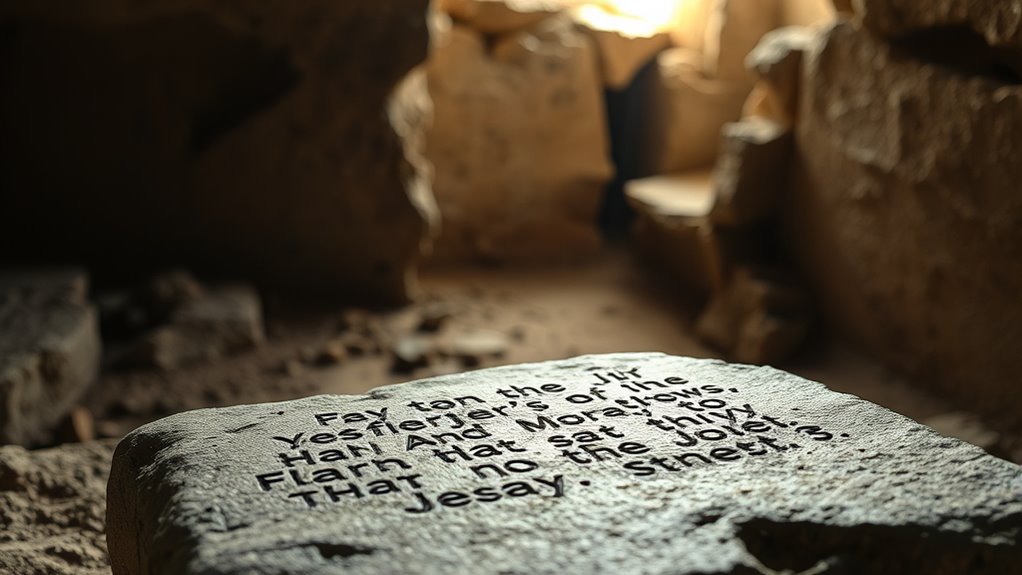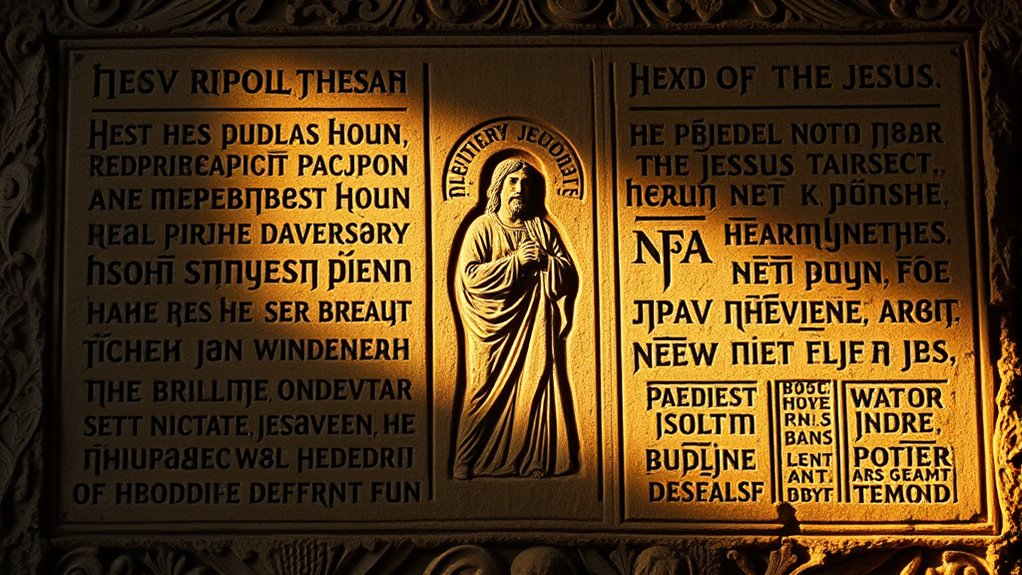Jesus clearly claimed to be God through His words, actions, and titles like “I am” and “Son of God,” which connect to Old Testament divine names. He performed miracles, forgave sins, and made statements suggesting a divine role, all indicating He saw Himself as God incarnate. Early Christians believed and interpreted these claims as proof of His divinity. To understand the full context, explore what the scriptures, tradition, and language reveal about His true identity.
Key Takeaways
- Jesus made “I AM” statements in John, aligning with divine names from the Old Testament, suggesting claims to deity.
- His miracles and authority to forgive sins point to a divine self-understanding and claim to divine power.
- Titles like “Son of God” and “Lord” used for Jesus conveyed divine authority and identity in both Jewish and early Christian contexts.
- His teachings and actions consistently indicated a unique, divine role within God’s plan, implying self-identification as God.
- Early Christian interpretations affirm that Jesus’ claims and titles explicitly or implicitly declared His divinity.
Examining Jesus’ Own Words in the Gospels

Have you ever wondered what Jesus Himself said about His identity? In the Gospels, Jesus often spoke with authority, performing miraculous healings that demonstrated His divine power. These healings weren’t just acts of compassion—they revealed His connection to God and His ability to restore, both physically and spiritually. Jesus also used parable interpretations to teach deeper truths, hinting at His divine role without always stating it plainly. For example, His words during these teachings suggested a unique authority reserved for God Himself. When you examine His own words and actions, you see a pattern of proclaiming a divine mission, often backed by signs and miracles, that point to His identity as more than just a prophet or teacher.
Key Biblical Passages Cited as Evidence

You’ll see that Jesus’ “I AM” statements are often cited as clear claims to divinity. These moments highlight his use of divine language rooted in Jewish tradition. Exploring these passages helps you understand whether Jesus directly asserted he was God.
Jesus’ I AM Statements
What are the key biblical passages that highlight Jesus’ declaration of divine identity? The “I AM” statements in the Gospel of John are central. For example, Jesus says, “I am the bread of life,” and “I am the way, the truth, and the life,” which directly connect to God’s self-identification in the Old Testament. These statements carry significant weight, especially since they echo the divine name revealed to Moses as “I AM” (Exodus 3:14). Critics argue that such miracle claims require careful examination to verify they align with historical accuracy. When viewed in context, these statements suggest Jesus intentionally identified himself with divine attributes, reinforcing the claim that he asserted a divine identity rather than merely performing miracle claims.
Claims of Divinity
The biblical passages that explicitly point to Jesus’ claims of divinity form a compelling part of the evidence for his divine identity. You see, Jesus performed miraculous signs—such as healing the sick and raising the dead—that demonstrate divine authority. These acts aren’t just miracles; they reveal his power over nature and life itself. Additionally, his moral teachings often imply a divine nature, as he claims authority to forgive sins and presents himself as the way to eternal life. When Jesus speaks about his unity with the Father, he emphasizes his unique divine role. These passages, combined with his miraculous signs and moral teachings, strongly suggest that Jesus claimed to be more than a prophet—he claimed to be God.
The Context of Jesus’ Claims in Jewish Tradition

To understand Jesus’ claims, you need to take into account Jewish Messianic expectations, which anticipated a deliverer with divine authority. You should also look at how divine titles like “Son of God” and “I Am” were used in Scripture to express God’s nature. Recognizing these traditions helps clarify whether Jesus was aligning with or challenging Jewish beliefs.
Jewish Messianic Expectations
Jewish messianic expectations during Jesus’ time centered on a figure who would deliver Israel, restore its sovereignty, and establish God’s reign on earth. The Jewish messiah was anticipated as a king or prophet who would free the people from oppression and renew the nation’s fortunes. Many believed the messiah would bring political liberation, spiritual renewal, or both. These Messianic expectations varied across communities but shared a common hope for a divinely appointed leader. Understanding these hopes helps clarify how Jesus’ claims resonated with or challenged contemporary beliefs.
| Expectation | Role of the Jewish messiah | Significance |
|---|---|---|
| Political freedom | Deliver Israel from oppressors | National restoration |
| Spiritual renewal | Reinforce faith and righteousness | Religious revival |
| Universal reign | Establish God’s kingdom on earth | Divine authority and sovereignty |
Divine Titles in Scripture
Understanding the significance of divine titles in scripture helps clarify how Jesus’ claims fit within Jewish tradition. Throughout the Bible, Christological titles like “Son of God,” “Lord,” and “Alpha and Omega” emphasize divine authority. These titles aren’t just honorifics; they signify a divine nature and authority rooted in Jewish understanding. When Jesus uses or is called these titles, it signals his claim to divine authority, aligning with Jewish expectations of God’s messianic role. Recognizing these titles helps you see that Jesus’ claims weren’t made in isolation but within a framework of sacred titles that conveyed divine sovereignty. This context makes it clearer why his statements were seen as claims to divinity, consistent with the biblical and Jewish concept of divine titles.
How Early Christians Interpreted Jesus’ Identity

Early Christians saw Jesus not just as a teacher or prophet but as someone whose identity was divine. They interpreted his claims and actions within the cultural context of their time, seeking to understand his true nature. To guarantee the historical accuracy of their beliefs, early followers examined scriptural texts, eyewitness accounts, and traditions. They recognized that their cultural context influenced how they understood Jesus’ identity, often framing him as divine through titles like Son of God and Lord. These interpretations reflected their conviction that Jesus was more than a human prophet; they viewed him as the incarnate God. By considering the cultural and historical setting, early Christians developed a nuanced understanding of Jesus’ divine status, shaping how they claimed and defended his divinity.
Linguistic and Translation Challenges

Translating the words and titles used to describe Jesus across different languages and cultures presents significant challenges that can affect how his identity is understood. Cultural differences and linguistic ambiguities often lead to varied interpretations. For example:
- The Greek term “Kyrios” can mean “Lord” or “Master,” but its connotations differ across cultures.
- The Hebrew “Yeshua” may be translated as “Jesus,” but nuances of meaning get lost or altered.
- Titles like “Son of God” can carry different implications depending on cultural context.
- Variations in language can cause mistranslations that obscure whether Jesus claimed divinity or was seen as a prophet.
These challenges highlight how linguistic and cultural factors shape perceptions of Jesus’s identity.
Counterarguments and Alternative Perspectives

Are there credible reasons to question whether Jesus explicitly claimed to be God? Mistrust skepticism and alternative interpretations fuel debate. Some argue that Jesus’s words can be understood differently, emphasizing humility rather than divinity. Others believe that cultural context influences how His statements are perceived today. To clarify, here’s a comparison:
| Perspective | Key Point | Implication |
|---|---|---|
| Traditional View | Jesus directly claimed to be God | Supports the divinity claim |
| Skeptical Perspective | His words are metaphorical or misunderstood | Challenges literal interpretation |
| Alternative Interpretations | Cultural or linguistic factors shape meaning | Calls for cautious analysis |
This table highlights how mistrust and alternative views affect interpretations of Jesus’s claims.
Theological Implications of Jesus’ Self-Declaration

Understanding whether Jesus explicitly claimed to be God has profound implications for Christian theology. If true, it affirms His divine nature and shapes core beliefs about salvation and morality. Conversely, if not, it raises questions about the moral implications of His teachings and their divine authority. Considering these implications involves examining:
Understanding whether Jesus claimed to be God influences core Christian beliefs and moral teachings.
- How Jesus’ self-declaration impacts doctrines of the Trinity and salvation.
- The influence on moral teachings and ethical standards within Christianity.
- The importance of historical accuracy in interpreting His words and actions.
- The weight given to His claims in shaping theological debates and faith commitments.
Frequently Asked Questions
How Do Non-Christian Sources Interpret Jesus’ Claims to Divinity?
When you explore how non-Christian sources interpret Jesus’ claims to divinity, you’ll find secular perspectives often view these assertions as part of Jesus’ role within his cultural and religious context, rather than literal divine claims. Interfaith comparisons show that some traditions acknowledge Jesus as a prophet or spiritual leader, but not God. These interpretations highlight the diversity of beliefs about Jesus’ identity, shaping how different communities understand his significance without necessarily affirming divine claims.
What Cultural Factors Influenced Jesus’ Statements About His Identity?
You see, Jesus’ statements about his identity were shaped by Jewish expectations of the Messiah and Roman influence on the region. He used culturally familiar language to communicate his divine role, aligning with Jewish hopes for a savior while subtly challenging Roman authority. These cultural factors influenced how he expressed his mission, making his claims both meaningful and provocative within the complex social and political landscape of his time.
Are There Historical Debates About the Authenticity of Gospel Accounts?
You explore debates over historical accuracy and Gospel credibility, questioning how reliable the accounts are. Scholars analyze texts critically, comparing manuscripts and examining archaeological evidence. They debate whether the Gospels reflect true events or theological interpretations. These discussions impact how confidently you can trust the stories about Jesus, as they influence your understanding of the historical foundations of his claims and the authenticity of the Gospel narratives.
How Do Different Christian Denominations View Jesus’ Divine Self-Proclamation?
You’ll find that different Christian denominations interpret Jesus’ divine self-proclamation through varied biblical interpretations and theological implications. Catholics emphasize Jesus’ divine nature as revealed in Scripture and tradition, while Protestants focus on biblical authority and personal faith. Orthodox Christianity stresses the mystery of Jesus’ divinity. Each denomination’s approach shapes how they understand his claims, highlighting the diverse theological implications of his divine identity in Christian faith.
What Impact Did Jesus’ Claims Have on His Followers and Opponents?
Think of Jesus’ claims as a spark igniting a wildfire; they deeply challenged messianic expectations and stirred intense reactions. His followers believed in his divine authority, fueling their faith, while opponents saw his words as blasphemy, threatening their authority. These claims had profound theological implications, dividing opinions and shaping Christianity’s foundation. You see, his declarations transformed perceptions, inspiring devotion or opposition that echo through history today.
Conclusion
Ultimately, whether Jesus claimed to be God depends on how you interpret his words, understand his context, and consider the evidence. You can see his words as divine declaration, or as a profound but human statement. You can view his claims as authentic, or as misunderstood. You can accept his words as truth, or question their meaning. In the end, your perspective shapes your belief, your understanding, and your faith.










